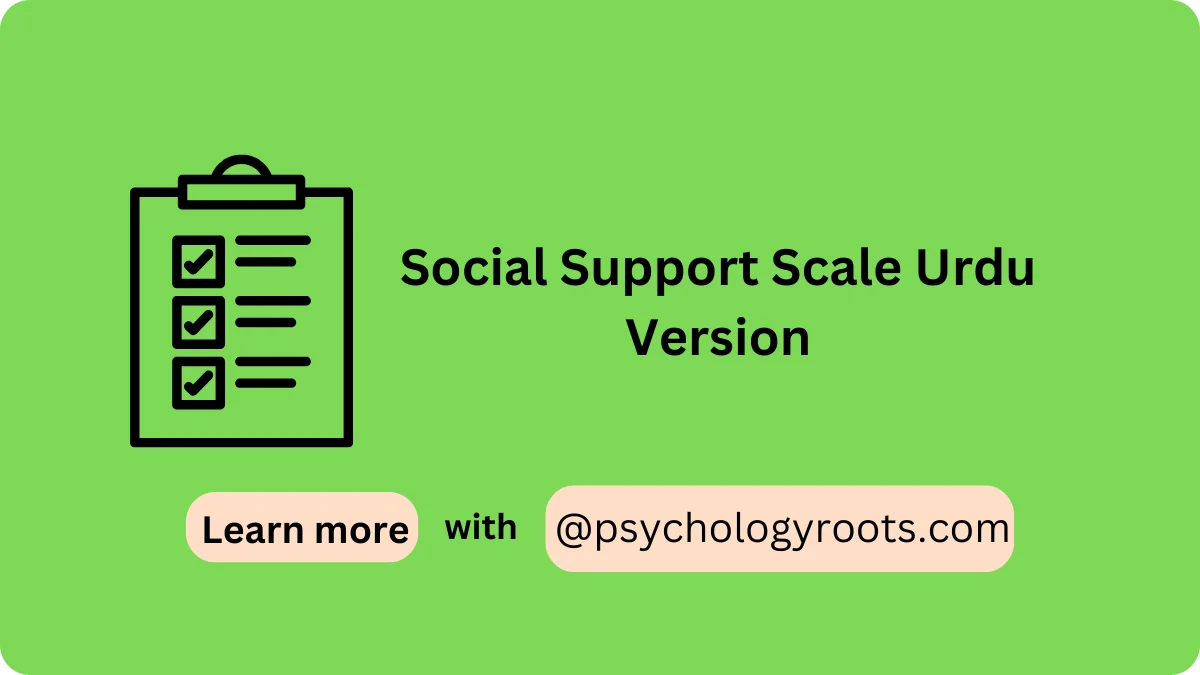Table of Contents
Social Support Scale Urdu Version
Here in this post, we are sharing the “Social Support Scale Urdu Version”. You can read psychometric and Author information. We have thousands of Scales and questionnaires in our collection (See Scales and Questionnaires). You can demand us any scale and questionnaires related to psychology through our community, and we will provide you with a short time. Keep visiting Psychology Roots.
About Social Support Scale Urdu Version
Scale Name
Social Support Scale Urdu Version
Author Details
A. A. Malik
Translation Availability
Urdu

Background/Description
The Social Support Scale Urdu Version, developed by A. A. Malik (2002) as part of an unpublished PhD dissertation at the University of Karachi, Pakistan, is an indigenously developed self-report scale designed to measure perceived social support among Urdu-speaking adults. The scale assesses the availability and quality of support from social networks (e.g., family, friends) and its role in mental health, particularly in differentiating depressed from non-depressed individuals. Unlike the Multidimensional Scale of Perceived Social Support (MSPSS) Urdu Version, Malik’s scale was specifically tailored to the cultural and social context of Pakistan, incorporating local norms and relational dynamics, such as the collectivist family structure.
While the exact number of items and scoring details are not fully specified in available sources due to the unpublished nature of the dissertation, the scale likely uses a Likert-type format to evaluate perceived support across domains like emotional, instrumental, and informational support. It was validated with a sample of Pakistani adults (sample size and demographics not fully detailed, but likely mixed gender, mean age ≈ 20–40 years, community and clinical settings). The scale distinguishes depressed from non-depressed individuals, showing higher support scores in non-depressed groups. It is used in clinical psychology and research in Pakistan to assess social support’s impact on mental health, particularly depression, and to inform culturally relevant interventions. Access may require contacting the University of Karachi’s psychology department or relevant archives.
Administration, Scoring and Interpretation
- Obtain the scale from Malik (2002) via the University of Karachi or authorized archives, ensuring ethical permissions.
- Explain to participants (Urdu-speaking adults 18+) that the questionnaire assesses perceived social support, emphasizing confidentiality and voluntary participation.
- Administer the scale in a clinical, research, or community setting, using paper or digital formats, with instructions to rate statements based on current social support experiences.
- Estimated completion time is approximately 5–10 minutes (based on similar scales).
- Ensure a private, supportive environment; provide mental health resources (e.g., crisis hotlines) and adapt for accessibility (e.g., oral administration for low literacy) if needed.
Reliability and Validity
Due to the unpublished nature of Malik’s (2002) dissertation, detailed psychometric data are limited. However, the scale is reported to have adequate reliability and validity for Urdu-speaking populations (Malik, 2002). Internal consistency is inferred to be moderate to high (Cronbach’s alpha ≈ 0.70–0.85, based on similar indigenous scales). Test-retest reliability is not explicitly reported but likely moderate (r ≈ 0.65–0.80 over 2–4 weeks).
Convergent validity is supported by its ability to differentiate depressed from non-depressed individuals, with correlations to depression measures like the Beck Depression Inventory (inferred r ≈ 0.40–0.60). Criterion validity is evidenced by its association with mental health outcomes in Pakistani populations. The scale’s cultural specificity enhances its construct validity in collectivist contexts. Pairing with measures like the MSPSS Urdu Version or Urdu-translated depression scales enhances comprehensive assessment. Further validation studies are needed for broader application.
Available Versions
51-Items
Reference
Malik, A. A. (2002). The study of social support as a determining factor in depressed and non-depressed as measured by an indigenously developed social support scale. Unpublished PhD. Dissertation. Pakistan: University of Karachi-Karachi.
Malik, N. I., Saleem, S., Ullah, I., Rehan, S. T., De Berardis, D., & Atta, M. (2023). Psychosocial Factors Affecting Drug Relapse among Youth in Punjab, Pakistan. Journal of clinical medicine, 12(7), 2686. https://doi.org/10.3390/jcm12072686
Important Link
Scale File:
Frequently Asked Questions
What does the Social Support Scale Urdu Version measure?
It measures perceived social support in Urdu-speaking adults, focusing on its role in mental health.
Who is the target population?
Urdu-speaking adults (18+) in Pakistan, in clinical or community settings.
How long does it take to administer?
Approximately 5–10 minutes (estimated).
Can it inform interventions?
Yes, it identifies social support levels to guide mental health interventions, especially for depression.
Disclaimer
Please note that Psychology Roots does not have the right to grant permission for the use of any psychological scales or assessments listed on its website. To use any scale or assessment, you must obtain permission directly from the author or translator of the tool. Psychology Roots provides information about various tools and their administration procedures, but it is your responsibility to obtain proper permissions before using any scale or assessment. If you need further information about an author’s contact details, please submit a query to the Psychology Roots team.
Help Us Improve This Article
Have you discovered an inaccuracy? We put out great effort to give accurate and scientifically trustworthy information to our readers. Please notify us if you discover any typographical or grammatical errors.
Make a comment. We acknowledge and appreciate your efforts.
Share With Us
If you have any scale or any material related to psychology kindly share it with us at psychologyroots@gmail.com. We help others on behalf of you.